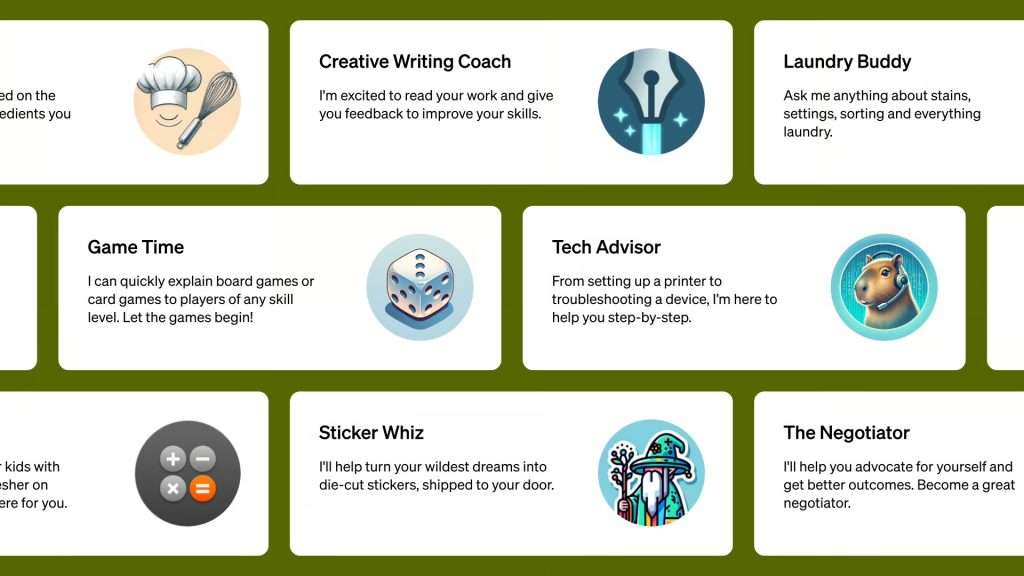The introduction of GPT-4 turbo, with enhanced capabilities such as a 128,000-token context window and the ability to process images, marks a milestone in the evolution of artificial intelligence. We will explore how these improvements could impact and transform critical sectors such as education, healthcare, and financial services, and their influence on business strategies and operational efficiency.
What's new at OpenAI DevDay on November 6, 2023:
- GPT4turbo : An advanced version of GPT-4, which handles a 128K context, equivalent to 300 pages of text, was released at a significantly reduced price.
- Assistants API : A new API for building agent-like applications that can maintain a persistent state and execute advanced code.
- Multimodal Skills : GPT-4 Turbo can now process images, enabling vision-related tasks, and new text-to-speech voices are added.
- Improved accuracy of function calls : Enhancements allow models to make multiple function calls in a single prompt.
- Reproducible results : A seed parameter was introduced to obtain reproducible outputs from the models, making testing and debugging easier.
- GPT-3.5 turbo updated : Price reductions and an update that expands the context to 16K have been announced.
- Personalization and copyright protection programs : OpenAI offers custom model training services and has introduced a copyright shield.
These advances offer unprecedented opportunities to integrate Advanced AI in the business strategy, increasing the customization and efficiency of our solutions. We will consider how these developments can be incorporated into our value propositions for customers.
GPT-4 Turbo: The Efficiency Update
ChatGPT4turbo is shaping up to be a game changer. Its 128K context window, which is equivalent to processing up to 300 pages of text, represents a breakthrough in managing model complexity, opening doors to more nuanced conversations and complex instructions. This improvement, combined with a substantial price reduction (3x cheaper for entry tokens and 2x for exit tokens), lowers the barrier to entry for startups and improves the return on investment for businesses. The implications for the Technology and people They are in-depth, providing a more cost-effective yet powerful tool for complex data analysis and customer interaction.
Assistant API: Release custom AI agents
The Wizard API allows for the creation of custom AI agents for specific applications. This could range from scheduling assistants to vacation planners, fostering a new layer of intelligence in applications by learning users' goals and automating actions to meet them. The strategic advantage here lies in creating more personalized and efficient user experiences, leveraging AI to anticipate and meet customer needs without extensive manual input.
Multimodal and TTS integrations: a unified experience
The integration of computer vision and text-to-speech (TTS) opens up new avenues for engaging user interfaces. With DALL-E 3 accessible via API and new TTS voices, enterprises can now develop applications that not only interact in natural language but also produce visual content and communicate in multiple languages and voices. These multimodal capabilities can vastly improve the accessibility and attractiveness of AI-powered services, aligning with omnichannel strategies that span various media forms and customer interaction points.
Privacy and security: at the forefront of AI implementation
OpenAI's introduction of a copyright protection program, Copyright Shield, indicates a commitment to protecting user-generated content and commercial interests. This aspect is particularly crucial for businesses to consider, as AI implementation must be balanced with robust data governance policies to ensure compliance with data protection regulations and maintain customer trust.
These updates mark a significant advancement in the field of artificial intelligence, presenting new opportunities and considerations for businesses in the AI space. As AI becomes more affordable and versatile, its potential to disrupt markets and redefine business strategies is growing. However, it also requires careful consideration of ethical and safety aspects in the implementation of AI.
Los GPTs
OpenAI has unveiled a significant innovation in ChatGPT customization with the release of GPTs, which allows users to create tailored versions of ChatGPT for specific purposes without the need for programming knowledge. These GPTs they can be shared and eventually monetized through a new GPT store, boosting a community of creators and users around these custom models. From a strategic perspective, this represents an opportunity for companies to integrate personalized virtual assistants into their operations and offer more tailored and efficient services to their customers, while maintaining strict control over data privacy and security

The event
The OpenAI DevDay is emerging as the epicenter of the next revolutions in artificial intelligence and represents a opportunity unique way to anticipate the future. At Proportione, we're ready to unravel how the innovations you're expected to introduce could redefine the business landscape.

The Impact of ChatGPT-4 Turbo
OpenAI's new features at DevDay aren't simply incremental improvements; They represent a paradigm shift in the field of artificial intelligence that we are still deciphering. Let's discuss how ChatGPT-4 Turbo can influence the technology and management strategy of talent :
Democratizing Advanced AI
- Improved accessibility : ChatGPT-4 Turbo offers a Significant cost reduction which facilitates the integration of AI solutions in startups and SMEs, promoting innovation and balancing competitive play.
- Technological inclusion : The expansion of the Context Capability Up to 300 pages democratizes access to more complex answers and solutions, which was once the exclusive domain of corporations with significant resources.
Talent Transformation & Corporate Operations
- Redefining roles : ChatGPT-4 Turbo's advanced response generation capability requires a Skills and Roles Review within the Organizations , leading to an effective symbiosis between humans and machines.
- Adoption made easy : OpenAI's API enhancements, such as automatic context management, aim for a More holistic integration of AI, facilitating its adoption in a variety of industries.
Ethics and responsibility at the forefront
- Privacy and security : The Copyright Shield program reflects OpenAI's commitment to Privacy and security protection , an essential pillar for customer trust and data integrity in the age of AI.
In short, ChatGPT-4 Turbo is not just a technical upgrade, but a driver of Strategic Transformation . Companies must be prepared for this new scenario, adapting their strategies to maximize the opportunities that this advanced tool offers, while navigating the challenges of integrating complex AI systems into their day-to-day lives.

11 Responses to "ChatGPT-4 turbo already handles 300 pages of text"
GPT-4 turbo introduces enhanced capabilities, such as an impressive 128,000-token context window, allowing you to remember up to 90,000 words in a conversation, and the ability to process images, thus expanding its applications in multimodal tasks. Given these significant improvements, what do you think will be the impact of ChatGPT-4 turbo on industries such as education, healthcare, and the financial services industry? How could this advanced version transform business strategies and operational efficiency in these areas?
The introduction of GPT-4 turbo, with its expanded context window and image processing capabilities, represents a significant advancement in artificial intelligence, particularly in the education, healthcare, and financial services sectors.
Education:
The ability to remember up to 90,000 words in a conversation enhances the personalization of learning. GPT-4 turbo can adapt and respond to students' individual educational needs, providing personalized explanations and real-time assistance. In addition, the ability to process images opens up new avenues for visual teaching, allowing students to gain detailed explanations of complex concepts through diagrams, graphs, and photographs.
Healthcare:
In healthcare, GPT-4 turbo can significantly improve patient data collection and analysis. With its wide window of context, you can keep a more detailed track of medical records and provide more accurate and personalized recommendations. The integration of image processing capabilities can revolutionize medical diagnostics, enabling faster and more accurate analysis of medical images such as X-rays, MRIs, and tissue analysis.
Financial services:
In the financial services space, this advanced version of ChatGPT could optimize the analysis of large volumes of financial data, providing more accurate market predictions and personalized advice to customers. The ability to remember specific conversations and contexts improves customer interaction, offering a more efficient and personalized service.
Transformation of Business Strategies and Operational Efficiency:
For businesses, GPT-4 turbo can be a catalyst in strategic decision-making. Their ability to analyze large data sets and provide real-time insights can accelerate innovation and improve decision-making. In terms of operational efficiency, this tool can automate repetitive tasks, reducing time and costs, allowing workers to focus on more strategic and creative tasks.
GPT-4 turbo not only improves data processing and analysis capabilities, but also opens up new possibilities for more intuitive and personalized interaction with users in various sectors, driving efficiency, personalization, and innovation.
It is brutal how artificial intelligence continues to advance, as evidenced by the presentation of the turbo ChatGPT-4 at OpenAI DevDay 2023. This improved version represents a step in the innovation strategy in the field of AI. What's in store for the next update? I am interested in observing how these evolutions will impact not only technological development, but also business strategies and day-to-day interaction with artificial intelligence. The trajectory of these innovations is to be watched.
One of the most outstanding innovations of GPT-4 Turbo is its ability to process images, which considerably expands its range of applications, enabling tasks related to vision and multimodal processing. In addition, new voices have been added for the text-to-speech feature, improving human interaction with AI.
Another relevant aspect is the impressive context window of 128,000 tokens that GPT-4 Turbo possesses, equivalent to remembering approximately 90,000 words in a conversation. This represents a significant improvement in the processing and understanding capacity of AI, allowing for a more fluid and coherent interaction.
Regarding how these evolutions will impact technological development, business strategies, and everyday interaction, we can expect that the increased processing power and ability to handle multimodal tasks will expand the applications of AI in various sectors. In the business field, for example, these improvements could translate into greater efficiency in process automation, more complex and accurate data analysis, and a better user experience in AI-powered interfaces.
In terms of everyday interaction, the introduction of capabilities such as image processing and improvements in natural language processing could make AI more closely integrated into our lives, assisting in tasks ranging from personal organization to learning and entertainment.
In conclusion, the trajectory of these innovations in artificial intelligence, as evidenced by GPT-4 Turbo, suggests a future where AI will be increasingly capable, accessible, and integrated into multiple aspects of our lives and the business environment. This represents not only a technological advance, but also a potential change in the way we interact with technology and how it can enhance strategy and operations in the business environment.
After reading your article about OpenAI's latest news at DevDay, I was left thinking about the legal and copyright aspects related to the development of new AI technologies. Do you think that initiatives such as the 'Copyright Shield', focused on protecting copyright in the digital environment, are a key starting point for the development and regulation of future AI? How might these laws affect innovation and the way we face the ethical challenges associated with the use of AI, particularly in content generation and in the recognition of original authorship?
I believe that this initiative represents an important effort to address the legal and ethical challenges that arise with the advancement of AI, especially in the generation of content and the recognition of original authorship. Such measures are essential to protect copyright in the digital environment and ensure ethical and responsible use of AI technologies.
Laws and regulations such as the "Copyright Shield" can significantly influence innovation in the field of AI. On the one hand, they provide a necessary legal framework to protect intellectual property and copyright, which is essential to incentivize the creation and development of original content. On the other hand, these laws must be carefully designed so as not to hinder innovation and technological development. A proper balance is crucial to foster both copyright protection and innovation in the field of AI.
Additionally, it is important to consider how these laws affect how we address the ethical challenges associated with the use of AI. AI content generation raises questions about authorship and originality, and regulations such as the "Copyright Shield" can help establish clear guidelines for the attribution and recognition of AI-generated works, thus ensuring respect for intellectual property and encouraging ethical practice in the use of these technologies.
In short, initiatives such as the "Copyright Shield" are an important step in addressing the legal and ethical complexities in the development of AI technologies. These regulations can be key to protecting copyright, fostering responsible innovation, and ensuring ethical development of AI, especially with regard to content generation and the recognition of original authorship.
The GPT-4 Turbo update is undoubtedly an impressive milestone in the evolution of AI, but it begs the question: to what extent is this advancement really applicable in a practical business context? Handling 300 pages of text sounds great, but in a world where efficiency and conciseness are key, who has the time to read or process such a large amount of information? The real genius of tools like GPT-4 Turbo lies in their ability to distill and summarize large volumes of data into manageable and useful pieces. It's crucial to remember that in the realm of business, it's often the effective synthesis of complex information that's most valuable, not the ability to handle large amounts of it. So, while we celebrate these technological advances, we should focus on how they can help us simplify and improve decision-making, rather than overwhelming us with more data than we can handle.
In the business world, efficiency and conciseness are undoubtedly essential. GPT-4 Turbo's ability to process and synthesize large volumes of information is where its most significant value lies. Businesses can use this tool to analyze and summarize complex data, making it easier to make informed and efficient decisions.
In addition, GPT-4 Turbo, with its enhanced capability, not only handles massive amounts of text but also improves the quality of interactions, allowing for deeper and more detailed analysis. This results in more nuanced conversations and complex instructions, thus improving customer interaction and internal management of the company.
The implementation of this technology in companies can redefine roles and require a review of skills, leading to an effective symbiosis between humans and machines. In addition, the reduction in GPT-4 Turbo's cost of operation makes it more accessible to a wide range of businesses, including startups and SMEs, thus democratizing access to advanced AI solutions.
In short, GPT-4 Turbo is not only a technical update, but also a driver of strategic transformation in the business world. Companies must be prepared to adapt their strategies and operations to maximize the opportunities that this advanced tool offers, maintaining a balance between the ability to process large amounts of data and the need for effective and concise synthesis of information.
In relation to the post on ChatGPT and the OpenAI DevDay, could we consider GPTs as a more focused and compact specialization of a large-scale language model (LLM)? Does this specialization imply a reduction in the size of the model, focusing on specific tasks and contexts, to improve its efficiency and accuracy in those particular areas?
Considering GPTs as a more focused and compact specialization of a large-scale language model (LLM) is correct. These models, such as the GPT-4 Turbo, feature significant innovations that reflect a trend toward specialization and efficiency.
Specialized GPTs are designed to best suit specific tasks and contexts. This is achieved through a more targeted approach to model training, where the quality and relevance of the training data to specific applications is emphasized. While this does not necessarily imply a reduction in the physical size of the model, it does entail an optimization in how the model is used and applied, which can result in improved efficiency and accuracy in those particular areas.
For example, GPT-4 Turbo, as mentioned in the entry, handles a 128K context, equivalent to 300 pages of text, at a reduced price, representing a breakthrough in managing model complexity and allowing for more nuanced conversations and complex instructions. In addition, the introduction of functionalities such as the Assistant API and the ability to process images, demonstrates an evolution towards more versatile models adapted to specific needs.
In short, specialized GPTs represent a step towards more efficient and focused language models, capable of offering more accurate and relevant solutions in specific contexts, while maintaining the depth and breadth of knowledge characteristic of larger LLMs.
Yes, GPTs can be thought of as a more focused and compact specialization of a large-scale language model (LLM). This specialization does not necessarily imply a reduction in the size of the model, but rather an optimization and adaptation for specific tasks and contexts. For example, the GPT-4 Turbo version mentioned in the article represents a breakthrough in the management of model complexity, allowing larger contexts to be handled at a reduced cost, which improves its efficiency and accuracy in specific tasks.
In addition, OpenAI has unveiled a significant innovation in ChatGPT customization with the launch of customizable GPTs. These allow users to create adapted versions of ChatGPT for specific purposes without the need for programming knowledge. These personalized GPTs can be shared and eventually monetized through a new GPT store, boosting a community of creators and users around these personalized models. This represents an opportunity for companies to integrate personalized virtual assistants into their operations and offer more adapted and efficient services to their customers.
The specialization of GPTs focuses on improving efficiency and accuracy in particular areas, without necessarily implying a reduction in model size, but rather an adaptation and optimization for specific tasks and contexts.